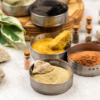Harnessing the Power of Herbs for Enhanced Cognitive Function
Harnessing the Power of Herbs for Enhanced Cognitive Function in our fast-paced, information-rich world, maintaining sharp cognitive function is crucial for success and well-being. As people seek ways to boost their brain health naturally, herbs have emerged as promising tools. Historically used in traditional medicine across various cultures, many herbs are now being studied for their potential cognitive benefits. This blog explores several key herbs known for their positive impact on cognitive function, their mechanisms, supporting research, and practical tips for incorporating them into your routine.
Understanding Cognitive Function

Cognitive function refers to mental processes such as memory, attention, learning, problem-solving, and reasoning. Various factors can influence cognitive health, including age, genetics, lifestyle, and diet. While cognitive decline is a natural part of aging, maintaining or improving cognitive function is desirable for many. Natural remedies, particularly herbs, offer a potential avenue for supporting brain health and enhancing cognitive performance.
1. Ginkgo Biloba: The Timeless Cognitive Enhancer
Ginkgo biloba, one of the oldest tree species, has been used in traditional Chinese medicine for over a thousand years. The leaves of the ginkgo tree are rich in flavonoids and terpenoids, compounds that contribute to its cognitive benefits.
Mechanism of Action:
Ginkgo biloba is believed to enhance cognitive function by improving blood flow to the brain. This increased circulation delivers more oxygen and nutrients, which can support cognitive performance. Additionally, its antioxidant properties help combat oxidative stress, a factor associated with cognitive decline.
Scientific Evidence:
Research on Ginkgo biloba’s effects on cognitive function has produced mixed results. However, some studies indicate it may benefit memory and cognitive speed, particularly in individuals with cognitive impairment. For example, a review in the Cochrane Database of Systematic Reviews concluded that Ginkgo biloba could offer a small positive effect on cognitive function in dementia patients.
How to Use:
Ginkgo biloba supplements come in various forms, including capsules, tablets, and teas. A typical dose ranges from 120 to 240 mg per day, divided into two or three doses. It’s essential to consult a healthcare provider before starting ginkgo, especially if you are on blood-thinning medications.
2. Rhodiola Rosea: The Adaptogen for Mental Stamina
Rhodiola rosea, known as “golden root,” is celebrated for its adaptogenic properties. Adaptogens help the body cope with stress, making Rhodiola a popular choice for enhancing mental resilience and stamina.
Mechanism of Action:
Rhodiola rosea supports cognitive function by reducing stress and fatigue. Additionally, Rhodiola may enhance neurotransmitter activity, including serotonin and dopamine, which are important for mood and mental clarity.
Scientific Evidence:
Several studies support Rhodiola’s benefits for cognitive function, particularly under stress. Research published in Phytomedicine found that Rhodiola rosea significantly improved mental performance and reduced fatigue in stressed individuals.
How to Use:
Rhodiola is typically taken as an extract, with a recommended dosage ranging from 200 to 400 mg per day. It’s best taken in the morning to avoid potential sleep disturbances. As with any supplement, consult with a healthcare provider before beginning Rhodiola.
3. Bacopa Monnieri: The Memory Enhancer
Bacopa monnieri, or Brahmi, is a staple in Ayurvedic medicine known for its cognitive-enhancing properties.
Mechanism of Action:
Bacopa monnieri contains bacosides, which are believed to enhance cognitive function by improving neuronal communication. The herb also has adaptogenic properties that may reduce anxiety and stress, further supporting cognitive health.
Scientific Evidence:
Research into Bacopa monnieri shows that it can positively impact memory and cognitive function. A review in the Journal of Ethnopharmacology found Bacopa effective in improving memory and learning in both healthy individuals and those with cognitive impairments. Its benefits typically become evident with long-term use.
How to Use:
Bacopa is available in capsule or powder form, with a common dosage ranging from 300 to 600 mg per day. It is often recommended to take Bacopa with food to improve absorption. Consistency is important, as the herb’s effects accumulate over time.
4. Panax Ginseng: The Energizing Herb
Panax ginseng, also known as Korean ginseng, is a well-regarded herb in traditional medicine for enhancing vitality and cognitive function.
Mechanism of Action:
Panax ginseng improves cognitive function by increasing energy levels and reducing mental fatigue. The ginsenosides in Panax ginseng support brain cell health and neurotransmitter function, which can enhance cognitive performance.
Scientific Evidence:
Studies on Panax ginseng suggest it can improve cognitive function, particularly in reducing fatigue and enhancing mental performance. For example, research published in Psychology and Aging found that Panax ginseng could improve cognitive performance and alleviate fatigue in older adults.
How to Use:
Panax ginseng is available in capsules, tablets, and teas. A typical dosage ranges from 200 to 400 mg per day. It’s generally advised to use Panax ginseng in cycles (e.g., several weeks on followed by a break) to avoid potential side effects like insomnia or nervousness.
5. Sage: The Culinary Herb with Cognitive Benefits
Sage (Salvia officinalis) is well-known as a culinary herb, but it also has a history of use in traditional medicine for cognitive enhancement.
Mechanism of Action:
Sage contains antioxidant and anti-inflammatory compounds that can support cognitive function. It is believed to improve cognitive health by increasing acetylcholine levels, a neurotransmitter essential for memory and learning.
Scientific Evidence:
Research supports Sage’s role in cognitive enhancement. A study in the Journal of Clinical Pharmacy and Therapeutics found that sage essential oil improved cognitive performance and mood in healthy adults. Another review in Evidence-Based Complementary and Alternative Medicine highlighted Sage’s potential to support memory and cognitive health.
How to Use:
Sage can be consumed as a tea, tincture, or supplement. For cognitive benefits, a common recommendation is 300 to 600 mg of sage extract daily. Starting with a lower dose is often advisable to gauge tolerance.
Safety and Considerations
While herbs offer potential cognitive benefits, they should be used with caution:
- Consult Healthcare Providers: Always speak with a healthcare professional before starting any new herb, particularly if you have existing health conditions or are taking other medications.
- Choose Quality Products: Select high-quality, standardized herbal supplements from reputable sources to ensure safety and efficacy.
- Monitor for Side Effects: Be aware of potential side effects and discontinue use if any adverse reactions occur.
- Integrate into a Healthy Lifestyle: Herbs should complement a balanced diet, regular exercise, and adequate sleep for optimal cognitive health.
Conclusion
Herbs have long been valued for their potential to support cognitive function and overall brain health. Ginkgo biloba, Rhodiola rosea, Bacopa monnieri, Panax ginseng, and Sage are among the most promising herbs for enhancing memory, focus, and mental clarity. By integrating these herbs into a healthy lifestyle, you may support your cognitive abilities and maintain mental well-being. As always, consult with healthcare professionals to tailor any herbal regimen to your individual health needs and goals.








Leave a reply